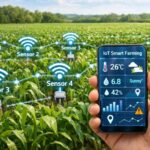In the agricultural industry, IoT technology is driving a revolution, paving the way for a future where farming is more efficient and sustainable. This technological transformation is redefining the landscape of agriculture, offering innovative solutions and opportunities to meet the ever-growing demands of our world while conserving precious resources.
Precision Agriculture IoT: Transforming Farming with Data-Driven Precision
Precision Agriculture IoT is at the forefront of a transformative wave in farming, where data-driven precision is the key to increased productivity and sustainability. By integrating IoT devices, such as sensors, drones, and smart machinery, farmers can collect real-time data on various aspects of their farming. This data includes soil conditions, weather patterns, crop health, and equipment performance. The power of this technology lies in its ability to enable farmers to make informed decisions with incredible precision. They can optimize irrigation, adjust fertilizer application, and precisely time planting and harvesting, all of which contribute to higher yields and resource efficiency.
Precision Agriculture IoT also plays a key role in sustainable farming practices. With accurate data, farmers can reduce the overuse of water, minimize the application of pesticides and herbicides, and cut down on energy consumption. It benefits the environment and improves the economic viability of farming. In an era where the global population is expanding, and climate change poses significant challenges, Precision Agriculture IoT emerges as a crucial tool in meeting the growing demand for food while reducing the ecological footprint of agriculture.
Livestock Monitoring IoT: Enhancing Animal Welfare and Farm Efficiency
Livestock Monitoring IoT is a transformative innovation in the agricultural sector, primarily focusing on improving animal welfare and farm efficiency. Farmers gain unprecedented insights into the well-being of their livestock by integrating IoT technologies, such as wearable sensors and smart tracking systems. Real-time data on factors like temperature, heart rate, and feeding habits allow farmers to promptly address any health concerns and ensure the comfort of their animals. IoT promotes ethical and humane treatment of livestock and yields higher-quality products, contributing to better outcomes for farmers and consumers.
The benefits of Livestock Monitoring IoT extend beyond animal welfare to farm efficiency. With precise data on the condition and behaviour of each animal, farmers can optimize feeding routines, breeding programs, and overall herd management. Internet of Things leads to reduced costs, increased productivity, and a more sustainable approach to livestock farming. In a world where responsible and efficient agriculture is paramount, Livestock Monitoring Internet of Things emerges as a critical enabler for achieving these dual objectives of animal welfare and operational excellence.
Crop Monitoring and Management with IoT: The Smart Farming Revolution
Crop Monitoring and Management with IoT marks a significant leap in agriculture, ushering in the era of smart farming. By harnessing the power of IoT technology, farmers can gain precise and real-time insights into their crops, leading to improved yields, reduced resource wastage, and greater sustainability. IoT sensors, satellite imagery, and weather data allow farmers to monitor soil moisture, temperature, and nutrient levels. This data will enable them to make data-driven irrigation, fertilization, and pest control decisions. This level of precision boosts crop yields and conserves valuable resources like water and fertilizers.
The Smart Farming Revolution isn’t limited to monitoring alone. IoT devices can also control various aspects of crop management. Automated systems can adjust irrigation and nutrient levels based on real-time conditions, ensuring crops are received when needed. IoT-enabled drones can survey fields and identify areas needing attention, helping farmers detect and respond to disease outbreaks or invasive pests promptly. This enhanced control over crop management empowers farmers to operate more efficiently, reduce costs, and minimize the environmental impact of their operations.
In a world challenged by population growth and climate change, Crop Monitoring and Management using IoT is a game-changer. It enables farmers to adapt and respond to the dynamic demands of modern agriculture, ensuring a sustainable and secure food supply while preserving the environment. As technology advances, the Smart Farming Revolution driven by IoT will play a pivotal role in shaping the future of agriculture.
Read Also : Ensuring Transparency & Efficiency in Agricultural Supply Chains using Blockchain
IoT-Enabled Supply Chain Management in Agriculture
IoT-enabled supply chain management in agriculture represents a transformative approach to modernizing the industry and improving efficiency. With the integration of Internet of Things (IoT) technology, farmers and agriculture gain unprecedented visibility and control over the entire supply chain, from seed to table. Sensors, smart devices, and data analytics are at the heart of this revolution, allowing stakeholders to monitor and manage various aspects of agricultural production and distribution in real time. For instance, sensors can be embedded in soil to measure moisture levels, and drones can be used to survey crops, all of which can provide critical data for decision-making. This data can then be transmitted and analyzed through cloud-based platforms, offering insights into crop health, weather conditions, and logistics. This information empowers farmers to make timely and informed choices about irrigation, fertilization, and harvest schedules, ultimately leading to increased yields and resource optimization.
Moreover, IoT-enabled supply chain management in agriculture enhances productivity and ensures greater traceability and transparency. The Internet of Things is paramount in today’s food industry, where consumers increasingly demand to know the origin of their products. IoT technology provides a detailed product history by tracking the movement of goods throughout the supply chain, from farms to processing facilities and distribution centres. This level of traceability is instrumental in the case of food safety issues or recalls, as it allows for pinpointing the exact source of a problem, thereby reducing health risks and minimizing economic losses. As IoT continues to evolve in the agricultural sector, it holds the potential to revolutionize how we produce and consume food, making the industry more efficient, sustainable, and responsive to consumer demands.
Smart Farming
Smart farming, also known as precision agriculture, is undergoing a significant transformation thanks to the integrating of the Internet of Things (IoT) technology. In smart farming IoT, sensors and devices are deployed throughout the agricultural ecosystem, collecting a wealth of data that empowers farmers to make data-driven decisions. These sensors can monitor soil conditions, weather patterns, crop health, and livestock activity, transmitting real-time information to a central platform accessible to farmers via smartphones or computers. With this technology, farmers can optimize resource allocation by applying water and fertilizers where needed most, reducing waste and environmental impact. Furthermore, IoT-enabled smart farming enhances crop management, leading to increased yields and more sustainable practices, ultimately contributing to a more efficient and profitable agriculture industry.
One of the significant advantages of smart farming with IoT is the ability to monitor and control agricultural operations remotely. Farmers can access their data and adjust their equipment or irrigation systems from virtually anywhere, saving time and resources. Additionally, predictive analytics and machine learning algorithms can provide insights into long-term trends and patterns, helping farmers plan for future seasons and make informed decisions to improve overall productivity. As the technology continues to evolve, smart farming IoT is poised to revolutionize the agriculture industry, making it more sustainable, efficient, and resilient in the face of ever-changing environmental challenges.




